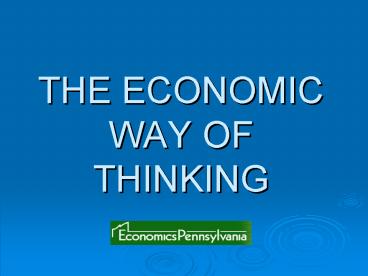THE ECONOMIC WAY OF THINKING - PowerPoint PPT Presentation
1 / 18
Title:
THE ECONOMIC WAY OF THINKING
Description:
They can rent jet skis, wind surf boards or sailboats. ... Wind surf boards. sailboats. 2. 5. 3. 1. 1. 2. 4. 2. 3. 5. 5. 4. 4. 3. 5. beach. 3. 1. 5. 5. 4. 12. 15. 21 ... – PowerPoint PPT presentation
Number of Views:319
Avg rating:3.0/5.0
Title: THE ECONOMIC WAY OF THINKING
1
THE ECONOMIC WAY OF THINKING
2
According to John Maynard Keynes
- The Theory of Economics does not furnish a body
of settled conclusions immediately applicable to
policy. It is a method rather than a doctrine,
an apparatus of the mind, a technique of thinking
which helps its possessor to draw correct
conclusions.
3
The Economic Way of Thinking
- Everything has a cost.
- People choose for good reasons.
- Incentives matter.
- People create economic systems to influence
choices and incentives. - People gain from voluntary trade.
- Economic thinking is marginal thinking.
- The price of a good or service is affected by
peoples choices. - Economic actions create secondary effects.
- The test of a theory is its ability to predict.
4
A Test Of Economic Reasoning
- The best things in life are free?
5
True or False????
- Anything worth doing is worth doing right.
6
A Tough One.
- Life is priceless
7
A Fair Trade?
- The purpose of economic activity is to improve
the well-being of some people at the expense of
others.
8
Mystery and Intrigue?
- Economic theory is not very useful because human
behavior is not predictable.
9
The Decision Tree
- For grades 1-3
- Students limit discussion to two choices
- Introduces good (benefits) and bad (cost)
alternatives - Clearly identifies opportunity cost
10
The Decision Tree model
- Your parents have given you a choice for your
birthday party. You and your friends can either
rent videos and games and stay home with pizza or
you can go to a paint ball place.
11
The Decision Tree
EVERYONE COMFORTABLE
UNUSUAL
EXCITING
MORE FRIENDS
DANGEROUS
TYPICAL
EXPENSIVE
PAINTBALL
HOME
TIME
12
The Decision Tree
PAINTBALL
EVERYONE COMFORTABLE
UNUSUAL
EXCITING
MORE FRIENDS
DANGEROUS
TYPICAL
EXPENSIVE
PAINTBALL
HOME
TIME
13
The Decision Tree
PAINTBALL
EVERYONE COMFORTABLE
UNUSUAL
EXCITING
MORE FRIENDS
DANGEROUS
TYPICAL
EXPENSIVE
PAINTBALL
HOME
TIME
14
The Decision Grid
criteria
alternatives
A USEFUL TECHNIQUE
15
The Problem
A typical family of four is vacationing at the
Jersey shore. They have set aside one day for fun
and adventure on the open seas. They can rent jet
skis, wind surf boards or sailboats. Anthony, the
13 year old, wants to drive something fast
through the water but Angela, the fifth grader,
has heard a lot about jet skis polluting the
water. Mom is concerned about safety and she also
wants to do something together as this is family
time. Dad is a little concerned about money as
all their other activities have cost more than he
had planned.
WHAT SHOULD THEY DO?
16
The Decision Grid
criteria
togetherness
low cost
no pollution
safety
adventure
alternatives
12
2
5
3
1
1
Jet skis
Wind surf boards
2
4
2
3
5
15
5
4
4
3
5
21
sailboats
18
beach
3
1
5
5
4
17
The Decision Grid
criteria
togetherness
low cost
no pollution
safety
adventure
alternatives
12
2
5
3
1
1
Jet skis
Wind surf boards
2
4
2
3
5
15
5
4
4
3
5
21
sailboats
18
beach
3
1
5
5
4
18
The Handy Dandy Guide
- People choose.
- All choices involve cost.
- People respond to incentives in predictable
ways. - Economic systems influence individual choices and
incentives. - Voluntary trade creates wealth.
- The consequences of choices lie in the future.































